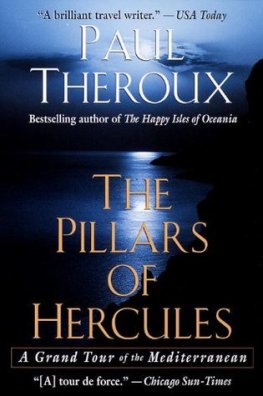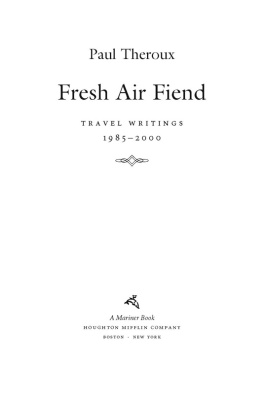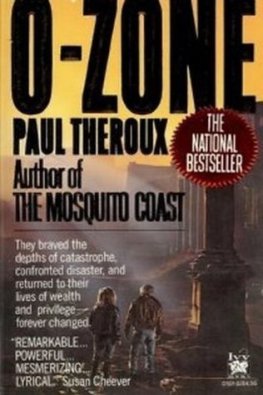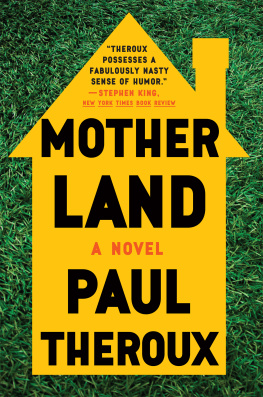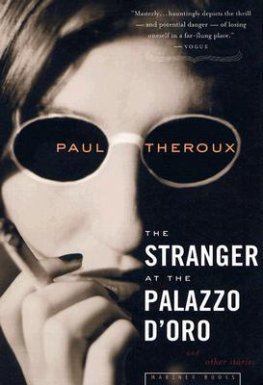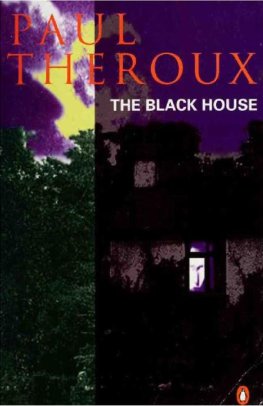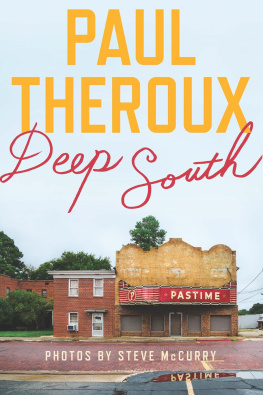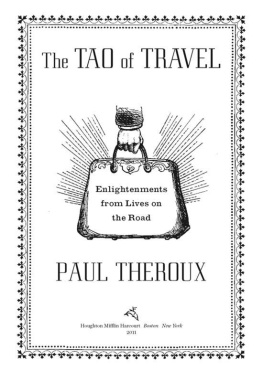Paul Theroux - Sunrise with Seamonsters
Here you can read online Paul Theroux - Sunrise with Seamonsters full text of the book (entire story) in english for free. Download pdf and epub, get meaning, cover and reviews about this ebook. year: 1986, publisher: Houghton Mifflin Harcourt, genre: Art. Description of the work, (preface) as well as reviews are available. Best literature library LitArk.com created for fans of good reading and offers a wide selection of genres:
Romance novel
Science fiction
Adventure
Detective
Science
History
Home and family
Prose
Art
Politics
Computer
Non-fiction
Religion
Business
Children
Humor
Choose a favorite category and find really read worthwhile books. Enjoy immersion in the world of imagination, feel the emotions of the characters or learn something new for yourself, make an fascinating discovery.
- Book:Sunrise with Seamonsters
- Author:
- Publisher:Houghton Mifflin Harcourt
- Genre:
- Year:1986
- Rating:4 / 5
- Favourites:Add to favourites
- Your mark:
- 80
- 1
- 2
- 3
- 4
- 5
Sunrise with Seamonsters: summary, description and annotation
We offer to read an annotation, description, summary or preface (depends on what the author of the book "Sunrise with Seamonsters" wrote himself). If you haven't found the necessary information about the book — write in the comments, we will try to find it.
Sunrise with Seamonsters — read online for free the complete book (whole text) full work
Below is the text of the book, divided by pages. System saving the place of the last page read, allows you to conveniently read the book "Sunrise with Seamonsters" online for free, without having to search again every time where you left off. Put a bookmark, and you can go to the page where you finished reading at any time.
Font size:
Interval:
Bookmark:
A Mariner Book
HOUGHTON MIFFLIN COMPANY
BOSTON NEW YORK
Copyright 1985 by Cape Cod Scriveners Company
ALL RIGHTS RESERVED
For information about permission
to reproduce selections from this book, write to
Permissions, Houghton Mifflin Company,
215 Park Avenue South, New York,
New York 10003.
Library of Congress Cataloging-in-Publication Data
Theroux, Paul.
Sunrise with seamonsters.
I. Title
PS 3570. H 458 1985 813'.54 85-2343
ISBN 0-395-41501-2 (pbk.)
Printed in the United States of America
QUM 17 16 15 14 13 12 11
To my Parents,
Albert and Anne Theroux,
With Love
"Words, words, words! There were no deeds," interrupted Rudin.
"No deeds! What kind of"
"What kind of deeds? Supporting a blind old granny and all her family by your hard workremember Pryazhentsev? There's a deed for you."
"Yes, but good words can also be deeds."
Ivan Turgenev, Rudin
(translated from the Russian by Marcel Theroux)
Introduction 1
The Edge of the Great Rift [1964] 7
Burning Grass [1964] 9
Winter in Africa [1965] 12
The Cerebral Snapshot [1965] 15
State of Emergency [1966] 18
Leper Colony [1966] 21
Scenes from a Curfew [1966] 23
Tarzan is an Expatriate [1967] 31
Cowardice [1967] 40
Seven Burmese Days [1970] 48
The Novel is Dead, Allah Be Praised! [1971] 58
The Killing of Hastings Banda [1971] 63
Lord of the Ring [1971] 76
A Love-Scene After Work [1971] 83
V. S. Naipaul [1971 and 1982] 91
Kazantzakis' England [1972] 101
Malaysia [1973] 106
Memories of Old Afghanistan [1974] 109
The Night Ferry to Paris [1975] 123
Stranger on a Train [1976] 126
An English Visitor [1976] 136
Discovering Dingle [1976] 140
The Exotic View [1977] 146
Homage to Mrs Robinson [1977] 152
My Extended Family [1977] 156
A Circuit of Corsica [1977] 166
Nixon's Neighborhood [1977] 171
Nixon's Memoirs [1978] 177
The Orient Express [1978] 182
Traveling Home: High School Reunion [1979] 185
Rudyard Kipling: The White Man's Burden [1979] 195
John McEnroe, Jr. [1979] 206
Christmas Ghosts [1979] 212
Henry Miller [1980] 215
V. S. Pritchett [1980] 218
The Past Recaptured [1980] 229
Railways of the Raj [1980] 234
Subterranean Gothic [1981] 239
Easy MoneyPatronage [1981] 259
Mapping the World [1981] 278
The Last Laugh [1981] 284
Graham Greene's Traveling Companion [1981] 289
Summertime on the Cape [1981] 297
His Monkey Wife [1983] 303
Being a Man [1983] 309
Making Tracks to Chittagong [1983] 313
Introducing Jungle Lovers [1984] 328
Dead Man Leading [1984] 331
What Maisie Knew [1984] 335
Sunrise with Seamonsters [1984] 346
Afterword 363
For the past twenty years I have been writing with both hands. I thought: I'll write a few more pieces and then I'll work on my novel. I never dared to entertain great hopes for my novelsor my travel books, either. But I always expected to be fairly paid for my journalism, which these fifty pieces are. This was specific labor of short duration that would finance my more ambitious, or at least more time-consuming, books. I assumed that one day I would gather some of these pieces together, but I never guessed it would be other than a motley collection, and certainly not a book in any symmetrical sense. This was, mainly, writing for moneypaying bills.
I think I was wrong. For one thing, the money for this work was not much. I had thought of including the fee I got for each piece: "The Killing of Hastings Banda," Esquire, 1971$600; "Malaysia," Vogue, 1973$70; "A Circuit of Corsica," The Atlantic, 1978$350; and so forth, as an instructive joke and a severe warning to anyone who intended to make a living this way. But then I decided that it would distract attention from the pieces themselves, and the price-tags might demean them. Anyway, these pieces hardly paid my bills. It was my books that saved me from dropping back into the schoolroom, or into the even more dire profession of writing applications for grants and fellowships ("My creative writing project is a novel about..."). And as for the question of symmetry, I hope this book is something more than a rag-bag anthology. I have waited this long so that it might have the proportions of a better bookfour dimensions and even a kind of narrative.
The early pieces sound a little forced and clumsy to me. I was twenty-two or twenty-three, and if the prose is harshly old-fashioned, then so was the setting. I wrote most of the early pieces in Africathe old Africa, with muddy roads and dusty faces; "Yes, Master," the elderly "houseboys" would say. This was Malawi, an ex-British Protectorate that was to turn into a franker kind of black dictatorship. It was not merely that there were no African members of the Blantyre Club, or that I had a cook and a gardener and they earned about $15 a month between them; and it was not the signs in the butcher shops advertising "Boys' Meat" (cheap mutton you were supposed to buy for your "houseboy"); no, stranger and more startling, it was the sight of African women who fell to their knees in the dust by the roadside as I passed on a motorcycle or a car, because of my white facebut it was whiter for having seen that. It was the Africa of leper colonies and Home Leave; and it was not regarded as inhuman but only bad manners for a white person to say, "Exterminate the brutes!"
I remember another day in Mozambique, in a terrible little country town, getting a haircut from a Portuguese barber. He had come to the African bush from rural Portugal to be a barber. What was so unusual about that? Mozambique had been a colony for hundreds of yearsthe first Portuguese claimed it in 1489. If I had asked, I am sure this barber would have said he was following in the footsteps of Vasco da Gama. He did not speak English, I did not speak Portuguese, yet when I addressed his African servant in Chinyanja, his own language, the Portuguese man said, in Portuguese, "Ask the bwana what his Africans are like." And that was how we held a conversationthe barber speaking Portuguese to the African who translated it into Chinyanja for me; and I replied in Chinyanja which the African translated into Portuguese for the barber. The barber kept sayingand the African kept translatingthings like, "I can't stand the blacksthey're so stupid and bad-tempered. But there's no work in Portugal." It was grotesque, it was outrageous, it was the shabbiest, darkest kind of imperialism. I could not believe my good luck. Twenty years ago in parts of Africa it was the Nineteenth Century, and living there I was filled with an urgency to write about it. I like the word "pieces". I wrote about it in pieces.
It has given me, in an overlapping way, two writing lives; in one I have been writing books, a lengthening shelf of them, and in the other life I have been writing these pieces. I regarded a book as an indulgenceI mean a "vision" but the word sounds too pompous and spiritual. These pieces I meant to be concreteresponses to experiences, with my feet squarely on the ground; immediate and direct, written to fulfill a specific purpose, and somewhat alien to the meandering uncertainties of the novel. They were also a breath of air. In the middle of writing Picture Palace I went to San Clemente and wrote about Nixon (and some of Picture Palace I wrote in the San Clemente Motor Inn); and the piece reprinted here which is an introduction to the O.U.P. paperback edition of His Monkey Wife I wrote during a break from The Kingdom by the Sea.
Next pageFont size:
Interval:
Bookmark:
Similar books «Sunrise with Seamonsters»
Look at similar books to Sunrise with Seamonsters. We have selected literature similar in name and meaning in the hope of providing readers with more options to find new, interesting, not yet read works.
Discussion, reviews of the book Sunrise with Seamonsters and just readers' own opinions. Leave your comments, write what you think about the work, its meaning or the main characters. Specify what exactly you liked and what you didn't like, and why you think so.


